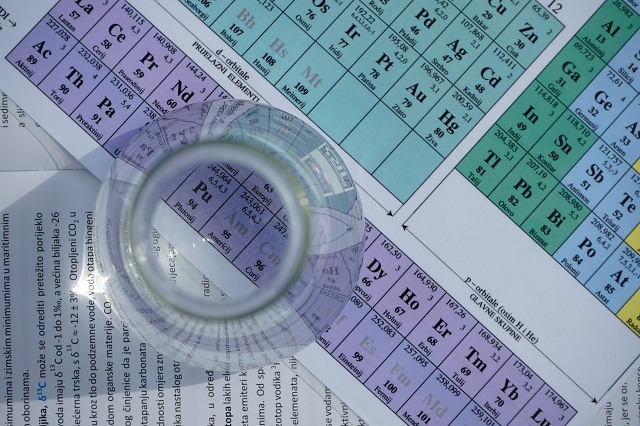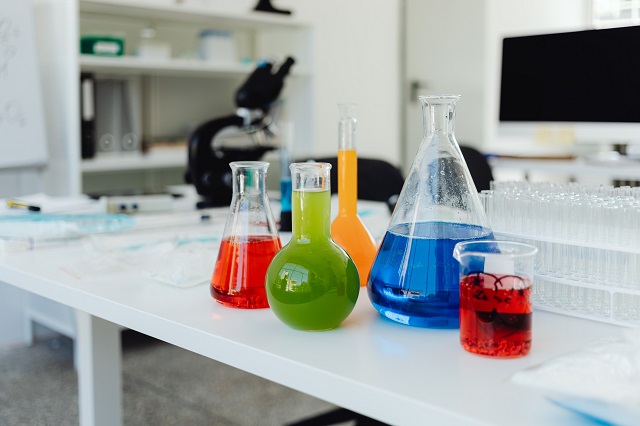Chemistry in Everyday Life: Discussing the huge impact chemistry has on people’s lives
Chemistry in Everyday Life: Discussing the huge impact chemistry has on people’s lives
🌐
Chemistry in Everyday Life: Discussing the huge impact chemistry has on people’s lives
What is chemistry? Experts define it as the study of the behavior and properties of matter, or the science of compounds and elements and the changes that occur when they interact with each other or with other things.
People’s lives are completely dependent on chemistry. When they wake up in the morning, they go to the bathroom and clean their teeth with toothpaste and a toothbrush. Both products are the result of a combination of chemicals. Then they eat breakfast, and the moment they take their first bite of food, a chemical reaction occurs in their bodies.

Photo by Vedana Filipovich on Unsplash
These examples could go on to show how chemistry affects every activity people engage in, but the above examples prove that chemistry is everywhere, even if we don’t realize it.
While some chemicals improve people’s lives, others can negatively affect them, so everyone should have some basic knowledge on the subject to prevent harm.
Why chemistry is vital to everyday life
It would be a blessing if we had to describe what science means to our lives in one word, as it improves our health and well-being through new discoveries and methods every day. Since they discovered it, people have used chemistry for their development and benefit. Let’s take a look at the multiple areas where chemistry is useful in everyday life:
1. Medical Chemistry.
As you can probably guess, drugs and drugs are chemicals that change your health and bodily functions. They interact with your body’s systems and cells and trigger specific biological responses. Every time you get sick or injured, you rely on chemistry to improve your health. Clinical laboratories are constantly testing chemicals and procedures to discover new ways to treat disease and prevent health problems.
Here are some examples of important medicinal chemistries for us:
- Antibiotics are chemicals produced by microorganisms and can effectively kill bacteria;
- Analgesics are pain relievers;
- Antacids are compounds that raise the pH of the body to a healthy level and eliminate excess acid in the stomach;
- Sedatives are medicines used to improve mental illness;
- Antiseptics are compounds used to prevent or destroy microbial growth on wounds.
- Disinfectants are chemicals that destroy dangerous microorganisms.
2. Chemical constituents in cleaning agents.
You use detergents such as soap, shampoo and detergent to clean your body, house and clothes every day. They are all made of several chemicals that react in specific ways when they come into contact with specific materials or surfaces. For example, the soap you use to wash your hands every day is made from ingredients like animal or vegetable oils and sodium hydroxide.
3. Chemicals in food.
If you’ve ever been on a diet, you know that it contains a range of macronutrients such as carbohydrates, protein and lipids. They are all safe and ideal chemical molecules to nourish your body and provide it with the nutrients it needs to function properly.
Chemicals are essential in the manufacture and preservation of food. When you cook, you use a range of supplements, additives and flavorings to enhance the quality of your dishes. Chemistry also provides farmers with pesticides, herbicides and fertilizers that they can use to grow healthy fruits, crops and vegetables.
4. Agricultural chemistry.
Assuming you’re new to gardening or farming, you probably don’t know what fertilizers, herbicides, or pesticides to use to keep your crops and vegetables healthy. You already know you need chemicals to keep fungi, bacteria and insects from damaging your crops, but you don’t know which chemicals are good for your plants.
Enrolling in an online chemistry course can give you the information you need as professionals share their knowledge with you and help you identify the chemicals you can use to get the best results in your harvesting process. You need insecticides to kill insects like insects and grasshoppers and prevent the growth of viruses, bacteria and viruses.
5. Chemicals in cosmetics.
You use lotions, shampoos, perfumes, and several other products every day for cosmetic purposes. All of these products are developed and tested in chemical labs to ensure they don’t harm your skin and health, but improve it. All cosmetics you use are made of compounds. Chemistry plays a vital role in maintaining the pH of the skin at normal levels.
6. Chemistry in Computerization.
Did you know that the main component of a computer is a microchip made of silicon? Chemistry discovered the properties and uses of silicone, so you can now use your computer thanks to it. The body of your laptop, smartphone or tablet is also made of plastic, a material obtained through a chemical process.
7. Chemicals in household appliances.
You already know that chemicals are in products like detergents, shampoos, soaps, and cleaners in your home. You use them to clean surfaces and remove stains. But chemistry is everywhere in your house. A fire that heats your stove to cook you a delicious meal is one example. Burning matchsticks, burning fuel, candles, and the tires and pipes of household appliances are all the result of chemical reactions.
Your refrigerator uses a range of chemicals to draw in the surrounding air and cool your food. Microwave ovens also have chemicals in them that refresh and heat food.
8. Green chemistry.
Green chemistry is vital to the planet because it protects the environment by improving, protecting and monitoring the conditions in which you live. Chemistry can create strategies and methods for measuring environmental pollution and, where possible, improve them.
Scientists have discovered several non-polluting chemicals and compounds that can be effective alternatives to traditional solutions. Chemistry also provides a complete understanding of pollutants to explain how pollution affects health. Scientists regularly test soil, water and air to ensure they prevent hazards and maintain ecological balance.

Photo by Karolina Grabowska from Pexels
in conclusion
Chemistry and its discoveries are needed every day as they explore the elements around them and allow people to exploit their properties. Chemistry is vital to our daily life as everything around us is made of chemicals and by gaining knowledge in this field we can improve our quality of life.
Keep it up Artkraft
Find more articles in our categories DIY Home & DIY Projects ou encore Tips & Crafts .
Thanks for visiting we hope our article Chemistry in Everyday Life: Discussing the huge impact chemistry has on people’s lives
, don’t forget to share the article on Facebook, pinterest and e-mail with the hashtags ☑️ #Chemistry #Everyday #Life #Discussing #huge #impact #chemistry #peoples #lives ☑️!

